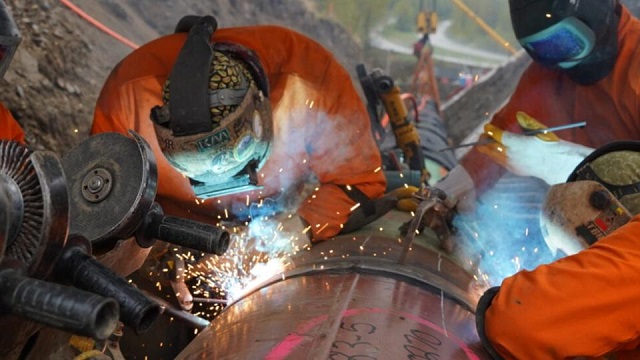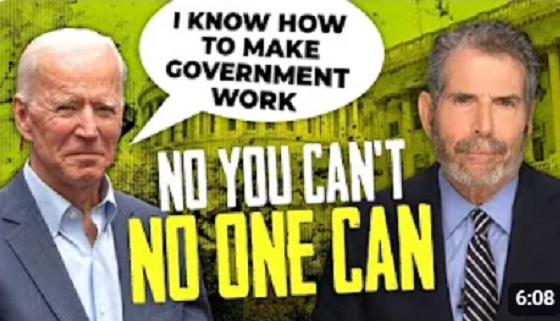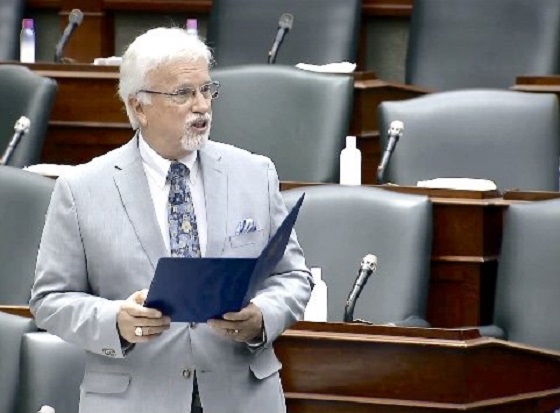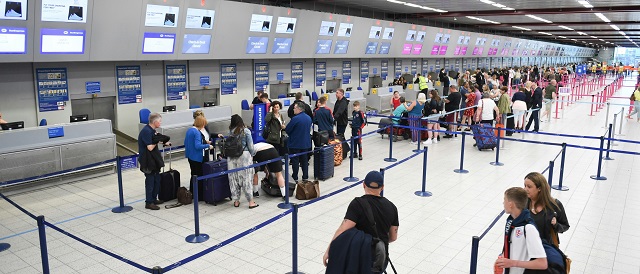Alberta
Andrew Scheer’s announcement and press conference on the opposition’s plan for the Trans Mountain Pipeline Expansion

From A News Release of The Official Opposition
The Leader of Canada’s Conservatives and the Leader of the Official Opposition, the Hon. Andrew Scheer, has laid out a two-step plan to get the Trans Mountain Expansion built and the steps a Conservative government will take in 2019 to undo the damage Justin Trudeau’s failures have caused.
“After years of failing to deliver results on the Kinder Morgan Trans Mountain Expansion, Justin Trudeau and the Liberals still have no plan of action to get the pipeline completed,” Scheer said. “What they announced last week gets us no closer to construction or completion of this critical project and what they have done over the last three years has inflicted terrible damage to our energy sector.
“That’s why today I am outlining steps Justin Trudeau should take immediately to get Trans Mountain built and announcing what a Conservative government will do to reverse Justin Trudeau’s failed policies and make Canada a place where energy investments are encouraged.”
These steps include:
Immediate completion of indigenous consultations
Appealing the Federal Court of Appeal’s ruling to the Supreme Court
Repealing Bill C-69 and ending the shipping ban in northern British Columbia
Enacting legislation to:
Clarify roles of proponents and governments in consultations
End foreign-funded interference in regulatory hearings
Provide certainty on approval timelines and schedules
Scheer reminds Canadians that four pipeline projects were completed under the previous Conservative government without spending one cent of taxpayers’ money. These include Enbridge’s Alberta Clipper, Trans Canada’s original Keystone pipeline, Kinder Morgan’s Anchor Loop, and Enbridge’s Line 9B Reversal. Together, they ship 1.2 million barrels of western Canadian oil every single day.
“The only thing that has changed between then – when pipelines were proposed, approved, and actually built – and now – when pipelines are suffocated to death by government overreach and incompetence – is Justin Trudeau becoming Prime Minister of Canada,” Scheer said.
BACKGROUND INFORMATION:
Step 1: What Justin Trudeau should do right now
Appoint a Ministerial Special Representative to complete the indigenous consultation process
Enact emergency legislation to affirm that Transport Canada’s analysis of tanker traffic was sufficient and does not need to be duplicated by the National Energy Board
Request a stay of the Federal Court of Appeal ruling and appeal the ruling to the Supreme Court of Canada
Support Bill S-245 to clarify that the pipeline is under federal jurisdiction
Step 2: What a Conservative government will do in 2019
Repeal the Liberal Carbon Tax
Repeal Bill C-69, the Anti-Pipeline Bill
End the ban on shipping traffic on the North Coast of British Columbia
Enact legislation that will:
Clarify the roles of proponents and governments that are involved in consultations;
Ensure that standing is given only to those with expertise or who are directly impacted by the project in order to end foreign-funded interference in regulatory hearings; and
Provide certainty to investors on approval timelines and schedules.
Use the federal declaratory power to declare a major project ‘for the general advantage of Canada’ under Section 92.10 of the Constitution Act, 1867, where we deem it necessary for future projects.
Alberta
Game changer: Trans Mountain pipeline expansion complete and starting to flow Canada’s oil to the world

Workers complete the “golden weld” of the Trans Mountain pipeline expansion on April 11, 2024 in the Fraser Valley between Hope and Chilliwack, B.C. The project saw mechanical completion on April 30, 2024. Photo courtesy Trans Mountain Corporation
From the Canadian Energy Centre
By Will Gibson
‘We’re going to be moving into a market where buyers are going to be competing to buy Canadian oil’
It is a game changer for Canada that will have ripple effects around the world.
The Trans Mountain pipeline expansion is now complete. And for the first time, global customers can access large volumes of Canadian oil, with the benefits flowing to Canada’s economy and Indigenous communities.
“We’re going to be moving into a market where buyers are going to be competing to buy Canadian oil,” BMO Capital Markets director Randy Ollenberger said recently, adding this is expected to result in a better price for Canadian oil relative to other global benchmarks.
The long-awaited expansion nearly triples capacity on the Trans Mountain system from Edmonton to the West Coast to approximately 890,000 barrels per day. Customers for the first shipments include refiners in China, California and India, according to media reports.
Shippers include all six members of the Pathways Alliance, a group of companies representing 95 per cent of oil sands production that together plan to reduce emissions from operations by 22 megatonnes by 2030 on the way to net zero by 2050.
The first tanker shipment from Trans Mountain’s expanded Westridge Marine Terminal is expected later in May.
 Photo courtesy Trans Mountain Corporation
Photo courtesy Trans Mountain Corporation
The new capacity on the Trans Mountain system comes as demand for Canadian oil from markets outside the United States is on the rise.
According to the Canada Energy Regulator, exports to destinations beyond the U.S. have averaged a record 267,000 barrels per day so far this year, up from about 130,000 barrels per day in 2020 and 33,000 barrels per day in 2017.
“Oil demand globally continues to go up,” said Phil Skolnick, New York-based oil market analyst with Eight Capital.
“Both India and China are looking to add millions of barrels a day of refining capacity through 2030.”
In India, refining demand will increase mainly for so-called medium and heavy oil like what is produced in Canada, he said.
“That’s where TMX is the opportunity for Canada, because that’s the route to get to India.”
Led by India and China, oil demand in the Asia-Pacific region is projected to increase from 36 million barrels per day in 2022 to 52 million barrels per day in 2050, according to the U.S. Energy Information Administration.
More oil coming from Canada will shake up markets for similar world oil streams including from Russia, Ecuador, and Iraq, according to analysts with Rystad Energy and Argus Media.
Expanded exports are expected to improve pricing for Canadian heavy oil, which “have been depressed for many years” in part due to pipeline shortages, according to TD Economics.
 Photo courtesy Trans Mountain Corporation
Photo courtesy Trans Mountain Corporation
In recent years, the price for oil benchmark Western Canadian Select (WCS) has hovered between $18-$20 lower than West Texas Intermediate (WTI) “to reflect these hurdles,” analyst Marc Ercolao wrote in March.
“That spread should narrow as a result of the Trans Mountain completion,” he wrote.
“Looking forward, WCS prices could conservatively close the spread by $3–4/barrel later this year, which will incentivize production and support industry profitability.”
Canada’s Parliamentary Budget Office has said that an increase of US$5 per barrel for Canadian heavy oil would add $6 billion to Canada’s economy over the course of one year.
The Trans Mountain Expansion will leave a lasting economic legacy, according to an impact assessment conducted by Ernst & Young in March 2023.
In addition to $4.9 billion in contracts with Indigenous businesses during construction, the project leaves behind more than $650 million in benefit agreements and $1.2 billion in skills training with Indigenous communities.
Ernst & Young found that between 2024 and 2043, the expanded Trans Mountain system will pay $3.7 billion in wages, generate $9.2 billion in GDP, and pay $2.8 billion in government taxes.
Alberta
Canada’s postal service refuses to help with Trudeau’s gun ban buyback program: report

From LifeSiteNews
According to a report, Canada’s mail service notified the Trudeau government via a letter that it would not participate in the buyback scheme, citing safety concerns for its employees.
Canadian Prime Minister Justin Trudeau’s federal government crackdown on legal gun owners through a buyback scheme has hit a major roadblock after Canada Post, a federal-run institution, signaled it will refuse to participate in scooping up thousands of legally purchased firearms at the bequest of the government.
According to government sources in a recent Radio-Canada report, the Trudeau Liberals were hoping Canada Post would help collect approximately 144,000 “assault” and “military-style” firearms that were recently banned by the government. Canada Post currently delivers guns via mail that are legally purchased to those with firearms licenses.
The inside source, who chose not to be named, noted that Canada Post notified the Trudeau government via a letter that it would not participate in the buyback scheme, citing safety concerns for its employees.
According to the source, Canada Post is still talking with the federal government, with one idea being to allow it to transport guns but not oversee getting them from their legal owners.
“It’s a challenge, but we do not think this jeopardizes our timetable or the government’s desire to move forward,” said one source, adding, “We want the discussions to continue.”
As for the Trudeau federal government, it continues to say that having Canada Post be involved in the gun buyback is the “most efficient” as well as “least costly” way to get the guns back from owners.
Trudeau’s gun grab was first announced after a deadly mass shooting in Nova Scotia in May 2020 in which he banned over 1,500 “military-style assault firearms” with a plan to begin buying them back from owners.
Late last year, the Trudeau government extended the amnesty deadline for legal gun owners until October 30, 2025. It should be noted that this is around the same time a federal election will take place.
The Canadian government’s controversial gun grab Bill C-21, which bans many types of guns, including handguns, and mandates a buyback program became law on December 14, 2023, after senators voted 60-24 in favor of the bill.
In May 2023, Bill C-21 passed in the House of Commons. After initially denying the bill would impact hunters, Trudeau eventually admitted that C-21 would indeed ban certain types of hunting rifles.
Alberta and other provinces promise to fight Trudeau’s gun grab tooth and nail
On the same day news broke that Canada Post said it would not participate in Trudeau’s gun buyback, Alberta chief firearms officer Teri Bryant last Wednesday issued a statement saying, “We urge the federal government to abandon this ill-advised program and meaningfully consult the provinces as we work to address the actual causes of firearms crime.”
“Canadians are still waiting for concrete details about the federal firearms confiscation program that has been in the works since 2020, and Canada Post’s refusal to participate in the federal government’s firearms ‘buy-back’ program is just one more example of how little forethought or engagement has gone into implementation of this program,” Bryant said.
Bryant noted that the buyback will not “significantly improve public safety” because it does not target those “involved in criminal activity and gun violence, and Albertans can be assured that our government will continue to advocate for our law-abiding firearms community.”
“We believe in a principled and informed approach to firearms policy that preserves public safety and recognizes the immense responsibility that comes with firearms ownership,” she noted.
Bryant observed that the federal confiscation program is not only causing uncertainty for many firearms businesses, but it is also “pulling attention and resources away from programs and initiatives that would help address public safety.”
“It is also undermining public confidence in the fairness of our entire firearms regulatory scheme,” she added.
Indeed, LifeSiteNews reported in February that despite Trudeau’s crackdown on legal gun owners, Statistics Canada data shows that most violent gun crimes in the country last year were not committed at the hands of legal gun owners but by those who obtained the weapons illegally.
Alberta Premier Danielle Smith, along with premiers from no less than four additional provinces, are opposed to C- 21.
Late last year, Smith promised she would strengthen the gun rights of Albertans because of Trudeau’s gun grab.
-

 Alberta2 days ago
Alberta2 days agoAlberta threatens to fight Trudeau government restrictions on Canada’s plastics industry
-

 John Stossel1 day ago
John Stossel1 day agoWhy Biden’s Just Wrong: NO ONE “Knows How to Make Government Work.”
-

 Business1 day ago
Business1 day agoWEF panelist suggests COVID response accustomed people to the idea of CBDCs
-

 Automotive2 days ago
Automotive2 days agoCanadian interest in electric vehicles falls for second year in a row: survey
-

 COVID-192 days ago
COVID-192 days agoFormer Canadian lawmaker has no regrets about refusing COVID shot despite losing his job
-

 COVID-191 day ago
COVID-191 day agoPeckford: Hallelujah! Supreme Court of Canada to hear Newfoundland and Labrador charter case
-

 illegal immigration1 day ago
illegal immigration1 day agoFlight Docs Reveal Which Cities Are Receiving Migrants Under Biden’s Parole Program
-

 Alberta1 day ago
Alberta1 day agoCanada’s postal service refuses to help with Trudeau’s gun ban buyback program: report





